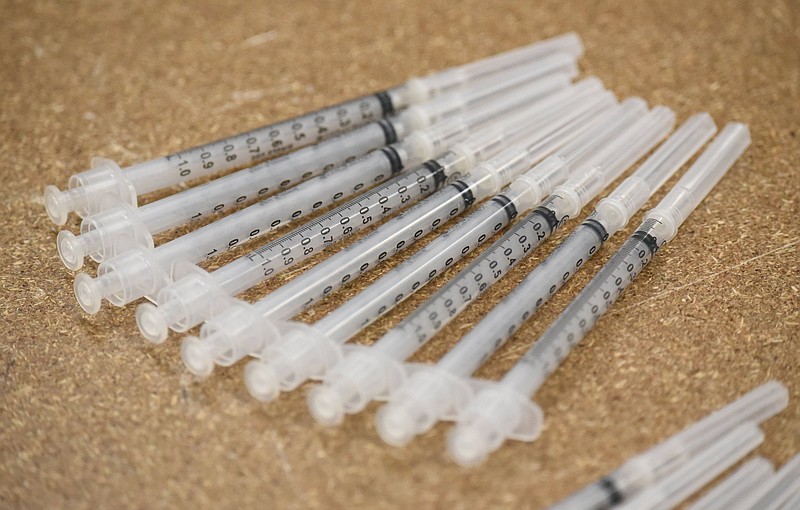Those hesitant to get a COVID-19 vaccine sometimes have basic questions such as, what's in it.
The answers are not quite as easy to come by as the frequent public health messages about where and how to get a vaccine. But they are available.
Dr. Rupali Limaye, a scientist at Johns Hopkins Bloomberg School of Public Health, where she directs behavioral and implementation science at the International Vaccine Access Center, said such concerns have existed for previous vaccines as well.
Limaye said, "Parents specifically were concerned about the types of ingredients that were in a vaccine," and Limaye said this long-standing concern exists with the new vaccines.
"It's just that we're in the middle of a pandemic, and so I think there's a lot more scrutiny on this vaccine compared to other vaccines that also went through the [Emergency Use Authorization] process, even though it'll go through a full approval process," she said. "I think there are still lingering concerns because of the speed and the development of the trials, and that's why I think we're hearing more about sort of 'anti-vaxxers.'"
Starting this week, the Times Free Press began tackling some of the common questions surrounding COVID-19 vaccine safety starting with, "How can the COVID-19 vaccines be safe if development was rushed?" With this installment, we'll look into:
Question: What's in a dose of COVID-19 vaccine and are the ingredients safe?
Answer: The three companies - Pfizer, Moderna and Johnson & Johnson - with COVID-19 vaccines available in the United States list the ingredients of their vaccines on their websites and on the U.S. Food and Drug Administration website.
The U.S. Centers for Disease Control and Prevention also lists the ingredients and states on its website, "None of the vaccines contain eggs, gelatin, latex or preservatives. All COVID-19 vaccines are free from metals such as iron, nickel, cobalt, lithium, rare earth alloys or any manufactured products such as microelectronics, electrodes, carbon nanotubes or nanowire semiconductors"
None of the COVID-19 vaccines contain the coronavirus, and they cannot give you COVID-19.
Daniel Salmon, the director of the Institute for Vaccine Safety at Johns Hopkins School of Public Health - whose website also contains a detailed list of vaccine components - advises that people use caution when reading ingredient lists to not take items out of context.
"You have to be careful when you look at the ingredients, because some ingredients look scary," Salmon said, citing formaldehyde as an example, which is used in some vaccines.
None of the COVID-19 vaccines authorized for use in the United States contain formaldehyde, but several false articles that are widely circulated on social media say that they do. The U.S. Food and Drug Administration lists common ingredients found in an array of U.S. licensed vaccines online and explains their functions.
"With almost everything, the poison's in the dose," he said. "So when you look at vaccine ingredients, you have to look at the quantities, and you have to put them in perspective."
The active ingredient in the Pfizer and Moderna vaccines is messenger RNA (mRNA), a small amount of genetic material that tells your body how to make the "spike protein" that's the hallmark of the coronavirus.
The Johnson & Johnson vaccine's active ingredient is an adenovirus, which is a virus family that causes the common cold, that has been modified to the point that it's harmless in order to transport the information needed to teach the body how to recognize the spike protein of the coronavirus to fend off infections.
Inactive ingredients for the vaccines include a combination of lipids, salts, sugars, acid and acid stabilizers. Johnson & Johnson's vaccine also contains a small amount of ethanol.
Salmon said that the mRNA in the Pfizer and Moderna vaccines will not alter your DNA. He suspects that this common misconception stems from people confusing mRNA and DNA, because the two acronyms sound similar, but their functions are quite different. The adenovirus also does not alter our genetic code.
"[The vaccines] are not changing your DNA. They contain a bit of the mRNA of the virus, which is what your body is responding to," he said. "It doesn't ever enter your DNA. It gives your body something to respond to, and then it just goes away."
For the Pfizer vaccine, the inactive ingredients include lipids (a group of organic compounds including fat and oil), potassium chloride, monobasic potassium phosphate, sodium chloride, dibasic sodium phosphate dihydrate and sucrose (sugar). Moderna's inactive ingredients are similar and include lipids, cholesterol, 1,2-distearoyl-sn-glycero-3-phosphocholine, tromethamine, tromethamine hydrochloride, acetic acid, sodium acetate and sucrose.
Johnson & Johnson's vaccine inactive ingredients include citric acid monohydrate, trisodium citrate dihydrate, ethanol, 2-hydroxypropyl--cyclodextrin (HBCD), polysorbate-80 and sodium chloride.
Contact Elizabeth Fite at efite@timesfreepress.com or follow her on Twitter @ecfite.
